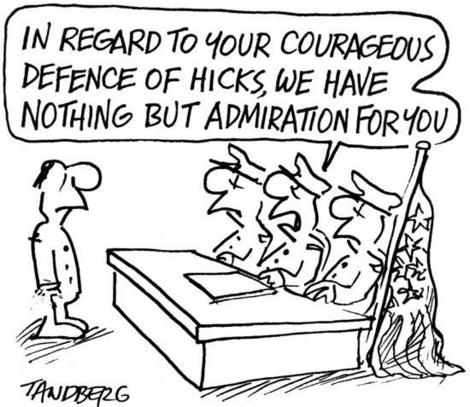Major Mori, 41, whose zealous defence of Hicks since November 2003 was admired by many Australians and instrumental in Hicks' lenient deal, has an uncertain future with the military and could potentially be assigned to non-legal work.
While it was expected he would be reassigned once his defence of Hicks was complete, it is believed Major Mori has been offered remote postings, including Guam and Chile, with only limited options for remaining on the US mainland.
The Age also believes Major Mori has recently been rejected for promotion from major to lieutenant-colonel and refused an application to attend a military judge's course at Army Judge Advocate General (JAG) School, which would have qualified him as a military magistrate.
Major Mori has ruled out rumours he was looking for a new career in Australia, but could not be contacted this week.
However, his commanding officer, Colonel Dwight Sullivan, who is chief counsel for the Guantanamo Bay detainees, confirmed that four of the six military defence counsel who have been considered for promotion had been passed over.
Colonel Sullivan, a military reservist from a civil liberties background who has headed the legal team since 2005, would not speculate on whether the US military was deliberately sidelining lawyers who took a public stand in defence of detainees.
But criticisms by the former US deputy assistant secretary of defence for detainee affairs, Charles Stimson, revealed the sometimes poisonous attitudes.
Mr Stimson, a former JAG lawyer, questioned the propriety of US law firms being involved in the habeas corpus defence of detainees and suggested corporations might boycott those firms.
Colonel Sullivan said he believed the team selected to represent the detainees was warned that representing al-Qaeda could be detrimental.
A colleague of Major Mori's who defended Salim Hamdan — the al-Qaeda member and driver in Afghanistan for Osama bin Laden — said late last year he might have to get a new job.
The highly respected Lieutenant-Commander Charles Swift, whose challenge on behalf of Hamdan brought down the first round of military commissions, was named one of the 100 most influential lawyers in the US but was passed over for promotion.
Colonel Davis said he doubted Hicks could live long enough to repay his debt to Major Mori.
It was a backhanded compliment given that Colonel Davis has accused the major of breaching Article 88 of the US Code of Military Justice and hinted he should be removed.
Colonel Sullivan said this week he backed the way Major Mori had conducted his defence of Hicks "100 per cent". He said it was the job of military defence counsel to defend those the US Government or US military was trying to prosecute.
Major Mori, who joined the navy in 1983 and served in Hawaii as head prosecutor for the marines before arriving at the military commissions, is believed to be considering his future.
Major Mori, who lives in Washington with his wife and twin sons, will make a final trip to Guantanamo Bay early next week to advise Hicks of his rights in relation to signing the final prisoner transfer agreement that will bring him home.
